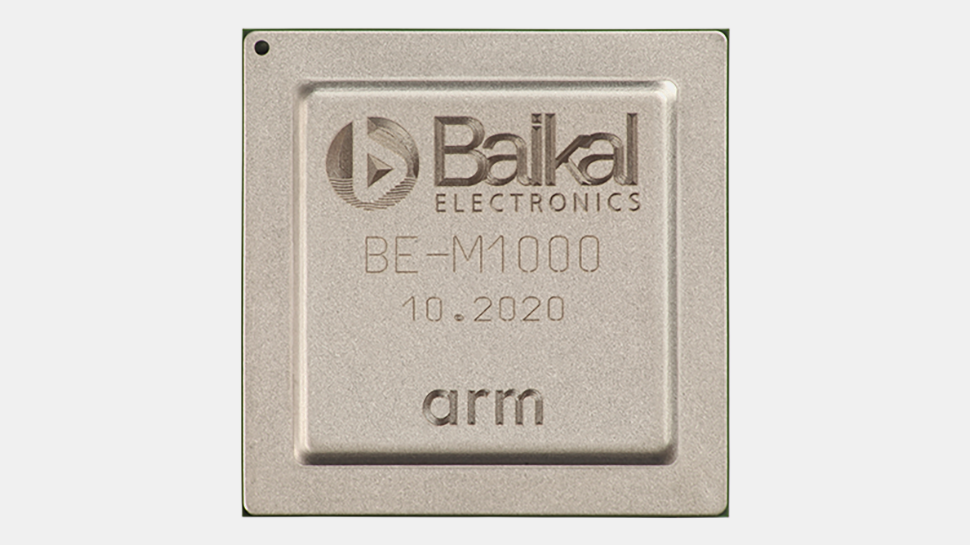Russian Chipmaker Baikal Goes Bankrupt, Assets Valued at Only $5 Million
Baikal's assets set to be auctioned off.

T-Platforms, the parent company of Russian chipmaker Baikal Electronics, has declared bankruptcy and is auctioning off its assets, including intellectual property related to Baikal processors, one of a few designers of CPUs and system-on-chips from Russia, reports CNews. According to Kommersant, the total value of these assets is estimated at $5 million.
T-Platforms, a Russian company with ambitions to build exascale supercomputers and develop domestic CPUs, was officially declared bankrupt in October 2022. T-Platforms had been among the few Russian companies capable of producing supercomputers that could compete on a global scale. T-Platform's bankruptcy proceedings have led to the auctioning of various assets, including the intellectual property, patents, and shares of Baikal Electronics. The IP is related to the development of Baikal processors, which rely on the Arm and MIPS instruction set architectures.
The technology being auctioned is outdated, to say the least. The Baikal-M1 processor, for instance, is based on eight outdated Arm Cortex-A57 cores operating at 1.50 GHz and outfitted with an 8MB L3 cache that is accompanied by an eight-cluster Arm Mali-T628 GPU with two display pipelines. TSMC made the SoC on its 28nm fabrication process. Meanwhile, Baikal's 48-core Baikal-S SoC for servers has never entered mass production. Since both processors are now obsolete, Baikal's assets have been valued at 484 million rubles ($5 million). The auction is scheduled for September 26, 2023.
The current owners of Baikal Electronics have no plans to reclaim the patents or developments. This is perhaps because Baikal used to develop CPUs and SoCs that were subsequently produced by TSMC, and the latter can no longer work with Russian companies due to export curbs imposed by the Taiwanese government following Russia's full-scale invasion of Ukraine in late February 2022.
The future of Baikal Electronics remains uncertain. The company has not announced new processors for several years, and production was halted in February 2022 due to sanctions. Despite the outdated technology and market skepticism, the auction is proceeding, and it remains to be seen who will acquire these assets and for what purpose.
Get Tom's Hardware's best news and in-depth reviews, straight to your inbox.

Anton Shilov is a contributing writer at Tom’s Hardware. Over the past couple of decades, he has covered everything from CPUs and GPUs to supercomputers and from modern process technologies and latest fab tools to high-tech industry trends.
-
artk2219 Reply
I can't say it's a surprise, I also can't say I'm happy to see another player leave the field even if they weren't a huge player, but repercussions for the actions of others are what they are sometimes. Especially when said actions have been particularly heinous.Admin said:No more CPUs and SoCs from Russian chipmaker Baikal as the company goes bankrupt.
Russian Chipmaker Baikal Goes Bankrupt, Assets Valued at Only $5 Million : Read more -
setx Another ARM clone died? Nothing of value was lost.Reply
MIPS, regrettably, is also killed by owner company. -
gg83 Reply
China will buy it I bet.greenreaper said:I wonder who valued it at that, and who might benefit from a low valuation. -
ltrttl You probably should double check information you post. T-Platfroms had only 1% of Baikal shares, which set to be auctioned off. By the way, Baikal CEO is glad that everyone thinks that Baikal has gone bankrupt (check Baikal Electronics tg chat, translator required)Reply -
artk2219 Reply
Eh, probably not, they already design and make better chips hah. I am curious to see if anyone will pickup that IP though.gg83 said:China will buy it I bet. -
purpleduggy Reply
why? what is the angle? was it vaporware?ltrttl said:You probably should double check information you post. T-Platfroms had only 1% of Baikal shares, which set to be auctioned off. By the way, Baikal CEO is glad that everyone thinks that Baikal has gone bankrupt (check Baikal Electronics tg chat, translator required) -
Panurg_it T-Platform only owns 1% of the stock. It is not the bankruptcy of "Baikal Elctronics", but the bankruptcy of "T-Platform"Reply